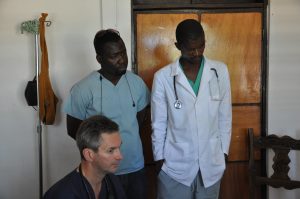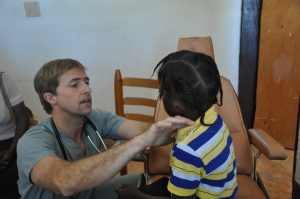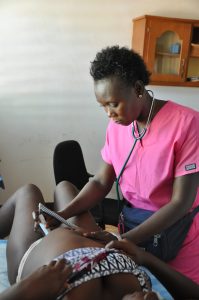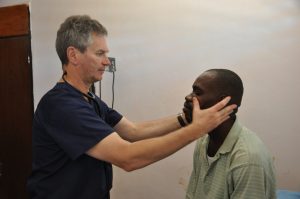I traveled to Haiti earlier this month with 3 physicians (Dr. Andrea Honeycutt, Dr. Travis Honeycutt and Dr. David Spivey). Michael Nemorin, a Haitian-American medical laboratory technician and Deb Griffin completed our group. In the US, I hear friends complain of being rushed in and out of a doctor’s office, of countless tests and of not being heard. I witnessed the art of healing in Haiti.
True, the resources available to our doctors were limited. We had brought an impressive supply of drugs. But those drugs only addressed certain conditions. Michael set up a new urinalysis machine in the lab at the Bill Rice Clinic and worked closely with Macknel Blanc and Jerome Detes in improving lab practices. But, the lab does not have the capability to do extensive blood tests. The clinic does not have an X-ray machine and the ultra-sound machine is very old. So, old-fashioned medicine was the order of the day.
But, the medicine practiced was thorough, thoughtful and compassionate. No patient was rushed. No complaint was dismissed. I witnessed physical exams – healing hands examining a body. The visiting doctors discussed each case with the Haitian clinic staff and with each other. Puzzling cases were discussed late into the night.
A baby was brought in with a nasal fistula related to a staph infection. This baby clearly needed a surgical repair. Michael phoned his brother-in-law, a pediatrician in Haiti. We emailed photographs of the baby – call it telemedicine! The surgery required special equipment and no hospital in Haiti could perform the surgery. The next day we learned that a team of surgeons from the US would be in Haiti in April and one surgeon would be bringing the necessary equipment. This baby will receive the needed surgical care in April.
A woman presented with a unusual skin condition. The doctors examined her, consulted each other and decided that we would ask to take photographs in order to consult with other doctors in the US. This woman, with great dignity, turned to leave and hugged every one in the room with “I do not know how to thank you enough.” That evening, the group realized that despite an uncertain diagnosis, this woman certainly needed sunscreen. We pooled our supply and the next morning asked Arthur Alexis, our driver and font of knowledge, to make sure that Mme Phillipe received the sunscreen. Not to worry, he reported, we would be going by her house that afternoon. Later that day, two of us set out for Matenwa with Arthur and Pere Vil. After a long, long hour on the infamous LaGonave “roads” we reminded Arthur about the sunscreen. He nodded and suggested patience. With each passing mile, we were stunned at the distance this woman had traveled to the clinic. Finally, Arthur stopped the truck by a small house. A child brought Mme Phillipe out of the house. We gave her the sunscreen, told her how to use it and gave her instructions to return to the clinic in February. Mme Philippe thanked us and told Pere Vil that she wanted to give us a gift. Pere Vil said that it was not necessary but she insisted that she wanted to give us a chicken. This is the essence of Haitian hospitality. A chicken, for this woman, represents a week of food, a necessary source of eggs. This was no token gift. (We declined the chicken!) As it turns out, we now have a diagnosis for this woman — a diagnosis that does not come with an easy treatment protocol. But, she was treated with great dignity and care and there will be an ongoing effort to treat her symptoms.
So, despite the lack of modern equipment, electricity, computer databases, there was true healing at the Bill Rice Clinic. That does not mean that all medical conditions were treated and resolved. It means that each person received intimate, personal, hands-on medical care.
